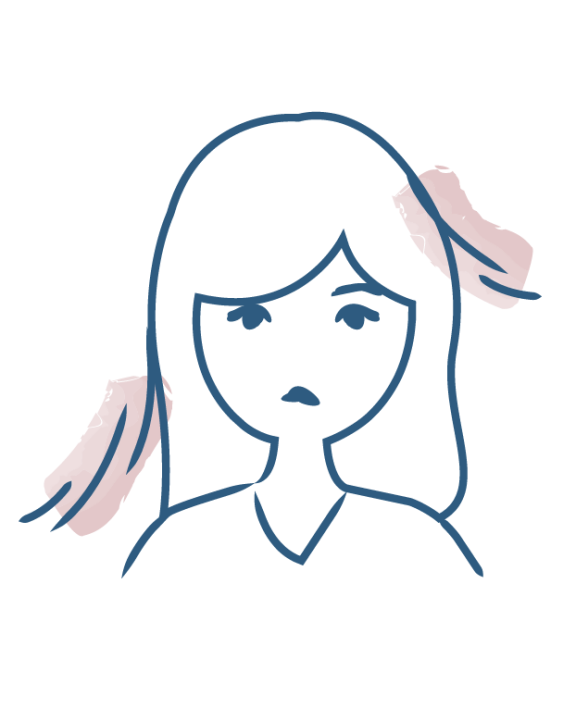What is hair loss?
Localized hair loss
- The causes of hair loss
- Hair loss: the impact of iron, zinc, vitamin D, C and B12 deficiencies
- Hair loss and genetics
- What is traction alopecia?
- Drug-induced hair loss
- Hair loss and hormones
- Hair loss and fatigue
- Hair loss and the pill
- Secondary syphilis and hair loss
- Hair loss and menopause
- Hair loss due to ringworm of the scalp
- Spot baldness and hair loss
- Hair loss due to stress: reactional hair loss
- Scarring alopecia
- Pregnancy and hair loss: everything you need to know
- Hair loss and Covid

Localized hair loss
Unlike diffuse hair loss, localized hair loss is restricted to certain areas of the scalp. Several factors may cause this pathology to develop, thus altering one’s self-esteem and leaving a significant psychological impact.
Localized hair loss: the importance of the clinical examination
Hair loss that appears in a very distinct area on the scalp and head is referred to as localized hair loss or localized alopecia. In this case, unlike with diffuse hair loss, where the hair falls evenly over the entire scalp, bald spots begin to develop in specific areas of the head. Different areas may be affected and vary depending on the various types of hair loss.
It is highly recommended to consult a dermatologist. A health professional will use the dermatoscope to diagnose this type of hair loss. This quick and simple method has improved the diagnosis and follow-up of scalp diseases. Mainly, it helps differentiate occasional or chronic hair loss from androgenetic alopecia. In addition, the pull test is conducted to determine the type of hair loss, so whether it is telogen effluvium or another type of hair loss.
What are the primary types of localized hair loss?
- Baldness is the most common form of androgenetic alopecia, resulting in localized hair loss in men, around the temple regions and the hairline. It is more diffuse among women.
- Traction alopecia, which is caused by overly tight and heavy hair styles, occurs with repeated pulling on the scalp. These mechanical manipulations result in regular hair loss localized around the hairline.
- Cicatricial alopecia, or scarring hair loss, is a rare and chronic condition that causes inflammation of the affected areas on the scalp. The hair follicles are destroyed and, as a result, permanent hair loss is observed in certain areas.
- Alopecia areata is a dermatological condition characterized by small bald patches. Anyone can be affected and at any age. This autoimmune disease progresses differently from one person to the next, but in the majority of cases, hair grows back in the area within the following 6 to 12 months.
- Some fungal scalp infections, such as tinea, may cause localized alopecia on different areas of the head. A medicinal treatment is required.
Our specific formulas for loss of hair density
Solutions for all types of hair density loss
- ANAPHASE NEOPTIDE Densifying Shampoo - Chronic loss of hair density &Thin-looking hair
ANAPHASE
ANAPHASE NEOPTIDE Densifying Shampoo - Chronic loss of hair density &Thin-looking hairRevitalizes - Helps to strengthen - Prevents loss of hair density - Strengthening thickening serum
ANAPHASE
Strengthening thickening serumSlows down hair loss - Boost growth - Densifies hair - Volumises - Increases hair anchorage - Increases hair thickness

What is your kind of hair density loss ?
Identify your hair density loss type via our diagnosis test and discover the care routine adapted to your hair’s needs.
More information
- Discover Chronic loss of hair density
What is hair loss?
Chronic loss of hair density
- Discover Androgenetic alopecia in women and men
What is hair loss?
Androgenetic alopecia in women and men
- Discover Everything you need to know about seasonal hair loss
What is hair loss?
Everything you need to know about seasonal hair loss
- Discover The hair's life cycle
What is hair loss?
The hair's life cycle
- Discover Hair loss in men
What is hair loss?
Hair loss in men
- Discover Diffuse hair loss
What is hair loss?
Diffuse hair loss
- Discover Hair loss in women
What is hair loss?
Hair loss in women
Our care routines
Loss of hair density, thinning hair
- Discover MY ROUTINE AGAINST CHRONIC HAIR DENSITY LOSS IN MEN (OVER 6 MONTHS)
MY ROUTINE AGAINST CHRONIC HAIR DENSITY LOSS IN MEN (OVER 6 MONTHS)
- Discover MY HAIR DENSITY LOSS ROUTINE FOR WOMEN (OVER 6 MONTHS)
MY HAIR DENSITY LOSS ROUTINE FOR WOMEN (OVER 6 MONTHS)
- Discover Anti-reactional loss of hair volume for post-pregnancy and breastfeeding women
Anti-reactional loss of hair volume for post-pregnancy and breastfeeding women
- Discover MY OCCASIONAL HAIR DENSITY LOSS ROUTINE FOR WOMEN (LESS THAN 6 MONTHS)
MY OCCASIONAL HAIR DENSITY LOSS ROUTINE FOR WOMEN (LESS THAN 6 MONTHS)
- Discover MY OCCASIONAL HAIR DENSITY LOSS ROUTINE FOR MEN (LESS THAN 6 MONTHS)
MY OCCASIONAL HAIR DENSITY LOSS ROUTINE FOR MEN (LESS THAN 6 MONTHS)
Dermatological expertise
To better understand your skin and hair, discover our exclusive content and innovative care products designed to improve your quality of life..





